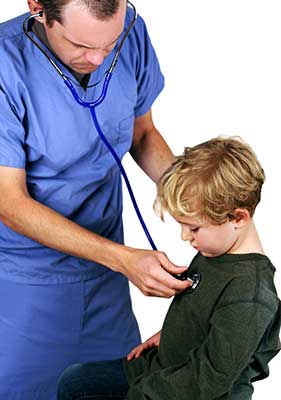What Should You Do if Your Child Swallows Your Medication?
Every 8 minutes, a child is rushed to the ER for medicine poisoning. Frightening but true, according to a report by SafeKids.org.
That’s because children are naturally curious about lots of things, and are particularly fascinated by anything mommy or daddy takes. So when they have access to medications, it’s a disaster waiting to happen.
As a parent, you want to do all you can to protect your children but with so many things coming at you daily, it is easy to forget to secure your medications. And that could be deadly for your children.
Most Dangerous Medications to Children

While any medicine can be poisonous to a child if taken under the wrong circumstances, the following types of medications are particularly dangerous.
Heart Medications
If a child ingests your heart medications accidentally, it can cause his (or her) heart rate and blood pressure to drop to dangerously low levels. This can result in the child going into shock and lead to cardiac arrest.
Pain Relievers
Over-the-counter and prescription pain medications are one of the leading causes of fatal child poisonings, and statistics show they caused 31% of deaths from poisoning in children younger than 5 years, in 2010.
Antidepressants
Antidepressant medications can make adult patients feel better but they do just the opposite to a young child who ingests them. As the second-highest cause of poisoning in children under 6, it seems patients aren’t doing enough to keep their medications out of reach. Antidepressants, allergy pills, and sedatives combined accounted for 17% of fatal child poisonings.
Diabetes Preparations
As diabetes becomes more prevalent, drugs for the disease are being prescribed more often. These medications can also be harmful to young children.
Over-the-Counter Medications
Many seemingly innocuous over-the-counter (OTC) medications are responsible for a surprisingly high rate of child poisonings. Products such as muscle rubs containing camphor or wintergreen, eye drops, and nasal sprays have the ability to cause seizures, coma, and other reactions in toddlers and young children.
Signs Your Child May have Taken Your Medications
If you suspect that your child may have accidentally swallowed your medications, there are warning signs to look for. If your child manages to get his hands on any of these medications, you’re likely to see signs such as nausea and vomiting, lethargy, or unusual sleepiness and drooling.
In some instances, your child might have a seizure or become agitated and in extreme circumstances could lapse into a coma.
Smart Storage for Your Medications
Prevention is always better than cure, so take precautions to ensure your child doesn’t have access to medications of any sort.
Store all medicines out of sight and reach of young children. Keep them in bottles with child-resistant caps, and make a point of replacing the bottle in its correct location every time you use it.
Not only will it be easier for you to find it, but it reduces the risk of leaving the medicine standing on a counter where your child can access it.
Try not to take your medicine in front of your children, to reduce the risk of him wanting to imitate your actions. Never refer to medicine or tablets as candy.
In the event of a child managing to get access, the idea that it could be something delicious makes the ingestion even more tempting. Ask your guests to keep any containers with medicine in them out of reach when they visit you, too.
Don’t keep leftover medicines around the house for years after you’ve finished taking them, either. It’s easy to overlook something you aren’t using regularly, and even though medications lose their efficacy over time they can still cause enough damage and heartbreak in the wrong hands.
What to Do If Your Child Swallows Your Medication
In the event that your child manages to swallow any quantity of medicine, it’s essential that you take immediate action.
Go to the Nearest Emergency Room (ER) – Don’t panic. Panicking will only aggravate the situation. Get him or her to your nearest emergency room without delay.
Try to determine what medicine he has swallowed and take the bottle with you to the emergency room, so you can tell the ER doctor the dosage and quantity he or she might have ingested. This will help the medical team to provide the correct treatment in as timely a fashion as possible.
There is a SignatureCare Emergency Center ER location near you in Texas should you need one – see below. You don’t need an appointment but if getting one works best for you, you can get an ER appointment here.




